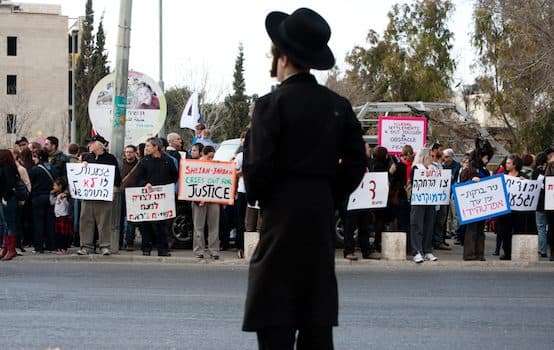
The 70th anniversary of Israel’s founding was a big deal in Hartsdale, New York. On Sunday, April 15, the otherwise innocuous Westchester County hamlet hosted a celebration of Israel at a local school. The day-long event featured an appearance by celebrity chef Gil Hovav, an ensemble of the Israel Defense Forces (which sang Israeli folk songs), dozens of tables of made-in-Israel olive oils, and a long line of political officials: Congresswoman Nita Lowey, Israeli Consul General Dani Dayan, assorted state assembly representatives, and a gaggle of Westchester County bigwigs.
Several days later, the celebration was front-and-center in the Scarsdale Inquirer, a popular must-read freebie of local events great and small. “We are all one,” the weekly newspaper headlined in bold type, and then offered an effusive description: “Hallways were transformed with cascading blue and white streamers and balloons, and classrooms hosted arts and crafts workshops and educational activities for children.” The Inquirer trumpeted the event’s popularity, with some 3,200 Israel admirers braving the “sudden cold weather and whipping winds” to attend.

The turnout was, in fact, not a surprise. One quarter of Westchester’s nearly one million citizens are Jewish and its affluent and highly educated residents (in places like Yonkers, White Plains, New Rochelle, and Chappaqua—where Bill and Hillary Clinton live), have always had strong ties to Israel. In many respects, Westchester is a kind of ground zero for Israeli support, a reassuring bellwether that Jewish America will not only remain in Israel’s corner, but provide votes for pro-Israel Democrats like Lowey and Hillary Clinton. That was true in 2016, when Clinton won 65 percent of all Westchester ballots, including 77 percent of votes in New Castle District 1, her home polling center.
But all is not well in Jewish America, or for supporters of Israel in Westchester County.
On the day that Hartsdale was celebrating Israel’s founding, IDF soldiers were shooting unarmed Palestinian protesters along the fence line that separates Gaza from southern Israel. The Palestinian protests, which began on March 30, had at that point resulted in nearly 30 dead and hundreds injured. The Israeli government shrugged off the bloodletting, with Israeli Defense Minister Avigdor Lieberman intoning that “there are no innocent people in the Gaza Strip.” But the killings roiled congressional Democrats, with House members issuing a statement denouncing Lieberman’s views, while, on the Senate side, Bernie Sanders offered a circular condemning Israel’s Gaza policies.
No one, of course, was predicting that Israel’s actions would mark a breaking point in U.S.-Israel relations, let alone sour the Democratic Party on its seven decade romance with Israel. But the reaction to the Gaza events symbolized the growing fissures in a party that is balancing its progressive ideals with its admiration for a nation whose policies are increasingly “excessive” (as the New York Times belatedly moaned). That view reflects the growing realization that the the plucky-little-Israel narrative of an older generation is being replaced by a not-this-again narrative of a younger generation that is increasingly unwilling to serve as Israel’s defenders.
“Something has really shifted,” Bernard Avishai, a visiting professor of government at Dartmouth College, told me during a telephone conversation from his home in Israel. “I have been at Dartmouth for eight years and I see a lot of undergraduates. And I can tell you from personal experience that my Jewish students are simply not tied to the older Jewish intelligentsia. But we shouldn’t conclude from this that they are pro-Palestinian. They’re not. Their view is ‘a pox on both your houses.’”
Just days before our conversation, Avishai—a commentator on Israel for publications read avidly by Acela Corridor intellectuals—had penned a mini-biography of Nitzan Waisberg for the New Yorker (a regular ornament, we might guess, of Westchester coffee tables), who returned to Israel after 44 years only to find that the country she admired had changed, and remarkably. “I came back to a country my grandparents founded, to raise my children,” Waisberg told Avishai. “I didn’t recognize the place.” Waisberg went on to explain that while she was “raised on modern Zionism,” her children “are instead being indoctrinated into a neo-Zionist theocracy.” There is “a culture war” in Israel, Avishai concluded, and Israelis like Nitzan Waisberg fear they are losing it.
That Israel is increasingly divided between a population of aging secularists (many of whom trace their roots to the nation’s founders) and an increasing number of religiously motivated nationalists (or even “ultra-nationalists”—the “theocrats” of Waisberg’s Israel), might be news to the Westchester denizens, but it’s not in Israel. The division is, in truth, a chasm. During a recent trip to Washington, Israeli newspaper columnist Akiva Eldar recalled a memorable dinner we had in Jerusalem that turned into a spontaneous celebration marking the sale of his home in Jerusalem—where one third of the Jewish population describe themselves as “ultra-orthodox.” During our meal, and after a long discussion (“I wanted to put my roots down among secularists,” he pointedly explained), Eldar proposed a toast: “There are really two Israels,” he said, raising his glass, “and here’s to mine.”
Ironically, the demographic shifts that have shaken Israel are now trembling through America. A startling United Jewish Appeal-Federation survey in 2011 provided the good-news-bad-news demographics for Democrats: the good news is that New York’s Jewish population had increased; the bad news is that most of the increase came in orthodox communities, which are conservative, nationalist, and less inclined to support the Democratic Party. While an overwhelming number of American Jews voted for Clinton in 2016, 54 percent of Orthodox Jews did not (Orthodox Borough Park in Brooklyn gave Trump 67 percent of its votes). Then, too, as the survey reported, the birthrate among Haredi Jewish households (those who reject secular culture) is three times as high as non-Orthodox birth rates. Borough Park is getting younger, Hartsdale is getting older. Put another way, the American Jewish community is as divided as Israel: “It’s almost two Jewish universes living within the boundaries of the United States with two different worldviews,” David Harris, the CEO of the American Jewish Committee, told one reporter.
The demographic shifts—the chasms, as it were—are noticeable to Democrats, and particularly to those who have long argued that the party needs to distance itself from its no-questions-asked view of Israel. The most prominent among them is James Zogby, the head of the Arab American Institute and veteran of the serial platform fights over Israel that have embroiled the party since its 1988 convention. During that convention, Zogby, a delegate for Jesse Jackson, argued for the inclusion of language in the platform that would recognize the Palestinians as a people with basic rights. While Zogby didn’t win that fight, its outcome was much closer than anyone predicted. The same was true in 2016, when Zogby, Matt Duss (then the head of a major D.C. Middle East-focused think tank and now a foreign policy advisor to Senator Bernie Sanders), and political activist Cornel West scaled the party’s Israel battlements by proposing a plank that explicitly described Israel as an occupier while stripping out platform language condemning the anti-Israel boycott, divestment, and sanctions (BDS) movement. While the Zogby-Duss-West triumvirate did not succeed, the three (hardly hair-on-fire radicals) set down a marker for future confrontations—and likely victories.
“It’s true that there have been major policy shifts in the Jewish population, and the impact of that on the Democratic Party is crucial,” Zogby says. “But so much of this depends on leadership. During the last convention, the Clinton forces were dominant, and Mrs. Clinton was the party’s presumptive nominee. That counted for a lot. I won’t make a prediction, but it could be far different next time. We’ll just have to see.” Lara Friedman, a prominent expert on the Israeli-Palestinian conflict and the president of the Foundation for Middle East Peace, emphasizes the importance of what appears to be growing supporting among Democrats for genuinely progressive positions on Israel-Palestine.
Friedman is outspoken over legislation that, in the name of defending Israel against the BDS movement, defines settlements as a part of Israel, and punishes activism, including a bill, “The Anti-Israel Boycott Act,” that was introduced by Maryland Democrat Ben Cardin. Friedman’s condemnation of the effort is visceral. The Cardin bill, she argues, not only legislates U.S. support for settlements that are illegal under international law, but violates the right of free speech. “This isn’t about Israel, this is about values,” she explains. “Either you defend free speech and fundamental human freedoms or you don’t. You can’t say you care about these things and then insist on carving out an exception for Israel. You can’t claim to have principles and then demand that Israel be held to a different and lower standard.”
Cardin’s hardline stance on BDS is not a surprise, but it has embarrassed a number of progressive Democrats, who are chagrined by his anti-free speech efforts and have steered clear of them. The effect has been notable: faced with mounting criticism of his legislation, Cardin says he went to extraordinary efforts to dampen it, a claim that Friedman rejects. “The changes made so far are cosmetic,” she says. “The bill violates the First Amendment right to free speech, as it is explicitly intended to do.” In fact, Cardin is a kind of pro-Israel throwback, an “aging and out-of-touch political figure” (as one Senate foreign policy staffer put it) who defends an Israel that no longer exists—“a Jewish Narnia” (as Nitzan Waisberg dubbed it), a mythic land of noble origin surrounded by evil. The fantasy is a touchstone for aging pro-Israel Democrats like Cardin.
The Cardin fantasy was on full display back in 2007, when I was asked to brief a group of Democratic senators on the Second Intifada, the Palestinian uprising that followed the failure of Bill Clinton’s Camp David peace process. In the course of the briefing, Cardin pointedly castigated the Palestinians for receiving arms shipments from Iran “through their airports.” When I pointed out that the Palestinians didn’t have any airports, he corrected himself. “Well, through their ports,” he said. When I pointed out that the Palestinians didn’t have any ports, either, he waved me off: “That’s not what the Israeli ambassador claims,” he told me, “and he wouldn’t lie.” The handful of other senators present at the briefing (all Democrats) shifted uncomfortably in their seats. They are still shifting uncomfortably.
Which is not to suggest that those Westchester County residents who trooped off to celebrate Israel’s 70th birthday last April 15 are unsophisticated Israel-can-do-no-wrong Democrats (or as guileless as Ben Cardin). They’re not. Rather, and ironically, secular Jewish Americans find themselves in the same kind of culture war currently being fought out in Israel, where a secular, progressive, affluent and educated community finds itself swamped by a burgeoning Jewish population that is Orthodox, traditional, conservative, politically powerful – and increasingly intolerant.
That Israel’s culture war has come to America is one of the Democratic Party’s worst kept secrets. It is not lost on Jewish Americans, for instance, that philanthropist Haim Saban (a high profile Israel defender and an influential Democratic Party funder), went out of his way to praise Trump son-in-law Jared Kushner at a Brookings Institute event—an incident that sent shock waves through the upper reaches of the party. Or that Donald Trump’s most loyal international supporter just happens to be the prime minister of Israel. That is all good news for the Republican Party (“the Republicans are now the party of Israel,” Zogby says, “and they’re also the party of born again Christians, Israel’s primary American ally”) and bad news for Democrats who, since the days of Harry Truman, have depended on Jewish Americans for votes—and funding. That is ending. “Yeah, this is a huge problem,” a ranking Democratic Party activist told me, in describing the shift. “Massive.”
Perhaps. But it seems unlikely that Westchester County’s Jewish congregants will somehow, in the name of Israel, renounce their progressive beliefs, suddenly become Republicans – or blithely defend the shooting of unarmed Palestinians. And they will also not abandon Israel even if, as it now seems obvious, Israel is in the process of abandoning them.
Mark Perry is a contributing editor at The American Conservative. He is the author of The Pentagon’s Wars and Talking To Terrorists. Follow him on Twitter @markperrydc.
Sourse: theamericanconservative.com






